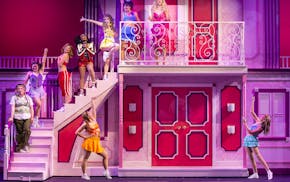If any film has the power to change the world, it's "Wicked."
When I saw it on stage, I thought it was an above-average show that would best be remembered for turning Gen Z-ers on to theater. And seeing young girls in the lobby dressed as princesses and witches was as uplifting as hearing "Defying Gravity."
But the movie version stirred me even more by doubling down on the show's anti-bullying theme and the consequences of shutting out those who don't look like us, messages that resonate more than ever.
Plenty of people have already experienced the magic. It made $162.5 million in its opening weekend, setting it up to be the most successful film ever based on a Broadway production. It's bound to be a contender during awards season.
One of the reasons for its popularity is that it's a companion piece to the beloved "The Wizard of Oz," one in which we discover that Elphaba, the Wicked Witch of the West (Cynthia Erivo), isn't all wicked and Glinda the Good Witch (Ariana Grande) isn't all good.
For others, that plot line is a major turnoff. They'd rather face down flying monkeys than sit through a musical.
But I urge skeptics to suffer through the sappy songs and focus on the moments that remind you of times you've felt like an outsider.
Sandy Lor, a 29-year-old social influencer based in the Twin Cities, had never seen the musical when she attended a special preview before the Nov. 22 release. The initial draw for her was Grande and director Jon M. Chu, who previously helmed 2018′s "Crazy Rich Asians," one of the best rom-coms of the past decade.
Lor didn't expect to get so emotional during the scene in which the green-faced Elphaba is ridiculed at a party for wearing a crooked, black hat and doing a dance that may remind you of Elaine Benes' herky-jerky moves on "Seinfeld." But the heart-wrenching moment turns to pure joy when she is joined on the floor by her college roommate Glinda, transforming them from bitter rivals to tight friends.
"I've been in Elphaba's shoes before," said Lor, who uses the name @sandysprosium when offering fashion and lifestyle tips online. "Her walking onto the dance floor was like me walking into the lunch area in high school and not knowing where to sit because I didn't have a clique. That scene shows that it takes just one person to be on your side to make a big change. I didn't know a movie could move me this much."
The bond between the two future witches is a huge part of both the film and the musical. The crowd I saw it with erupted into applause when the original version's pair, Idina Menzel and Kristin Chenoweth, made unexpected screen cameos.
But I had completely forgotten about the dark sub-plot in which there's a campaign to domesticate Oz's talking animals by caging them and slowly robbing them of their ability to speak. Chu emphasizes that story line in the film by adding some sympathetic characters, including a bear nanny who nurses Elphaba through her childhood, and a cub that grows up to be the Cowardly Lion.
One of the film's more harrowing moments is when Dr. Dillamond (voiced by Peter Dinklage) is arrested for the "crime" of being a brilliant goat.
"When he's taken away, Elphaba asks, 'What are we going to do?"' said Dan McNeil, executive director at Peacemaker Minnesota, a Roseville-based nonprofit committed to fighting harassment in schools. "I hope that's a question everyone asks when they see bullying going on."
The film also has a direct correlation to debates around the world about immigration, assimilating — or rejecting — other cultures.
That theme was one of the reasons Chu, whose parents were born in Taiwan and China, jumped at the chance to direct "Wicked."
'''The Wizard of Oz' had such an influence on my own family — an immigrant family that came to America with these dreams,'' Chu told the New York Times. ''We're going through such a changing period in our culture, and this hit it so on the nose — that change is difficult, that the Yellow Brick Road may not be the path for all of us."
McNeil thinks the film might inspire conversations with friends and family during the holiday season. At the very least, it may make those already standing up against discrimination feel like they've got reinforcements.
But can a movie, even a blockbuster, really bring us closer together? It can't hurt.
"It takes schools, political leadership, corporate leadership, but also cultural influences like movies and music," McNeil said. "Every little bit helps."

For 'Legally Blonde' star, 'being underestimated is her secret superpower'

Restaurant openings and closings in the Twin Cities

24 terrific books for the beach, cabin or lawn chair you'll want to read this summer

Worth It podcast: Prince week, a giant pencil, pool parties and women's sports

